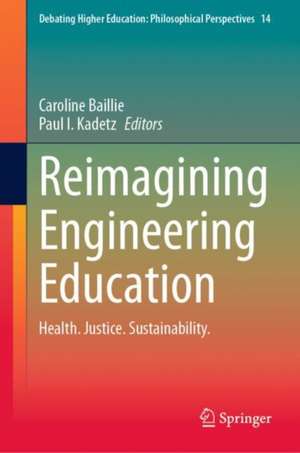Reimagining Engineering Education: Health. Justice. Sustainability.: Debating Higher Education: Philosophical Perspectives, cartea 14
Editat de Caroline Baillie, Paul I. Kadetzen Limba Engleză Hardback – 20 sep 2024
The book introduces a unique framework and language for engineering education which considers both the problems of the past and present, and the potential solutions offered for the future. By reaching out beyond the bounds of traditional knowledge and thought collectives, this book will also offer a pathway for other professional education programs to explore.
Preț: 729.36 lei
Preț vechi: 889.47 lei
-18% Nou
Puncte Express: 1094
Preț estimativ în valută:
139.61€ • 151.70$ • 117.35£
139.61€ • 151.70$ • 117.35£
Carte disponibilă
Livrare economică 31 martie-14 aprilie
Preluare comenzi: 021 569.72.76
Specificații
ISBN-13: 9789819752607
ISBN-10: 9819752604
Ilustrații: XX, 180 p. 15 illus., 10 illus. in color.
Dimensiuni: 155 x 235 mm
Greutate: 0.49 kg
Ediția:2024
Editura: Springer Nature Singapore
Colecția Springer
Seria Debating Higher Education: Philosophical Perspectives
Locul publicării:Singapore, Singapore
ISBN-10: 9819752604
Ilustrații: XX, 180 p. 15 illus., 10 illus. in color.
Dimensiuni: 155 x 235 mm
Greutate: 0.49 kg
Ediția:2024
Editura: Springer Nature Singapore
Colecția Springer
Seria Debating Higher Education: Philosophical Perspectives
Locul publicării:Singapore, Singapore
Cuprins
Chapter 1. Introduction to the Book (Caroline Baillie and Paul Kadetz).- Part I: Engineering and Transdisciplinarity.- Chapter 2. The Order of Knowledge: Disciplinarity, Transdisciplinarity, and Beyond (Paul Kadetz).- Chapter 3. Transdisciplinary Design Thinking and Learning from Nature (Chris Rose).- Part II: Engineering for Health, Justice and Sustainability.- Chapter 4. ‘Wholing’ Health (Paul Kadetz).- Chapter 5. Unpacking Sustainability: The Case of Agriculture (Paul Kadetz).- Chapter 6. Empowering Sustainable Communities: Integrating Environmentally and Socially Conscious Engineering Education for Effective Waste Resource (Prasadi H L Arachchige and Randika Jayasinghe).- Part III: Transformations in Thinking.- Chapter 7. Just Transitions in Engineering Education (Shehla Arif).- Chapter 8. Prior Thanksgiving: The Challenge to Engineering of the Words That Come Before All Else (Chris Beeman).- Chapter 9. An Engineering Filled with Gratitude for All Living Things (George Catalano).- Part IV: Knowledge Sharing in Praxis.- Chapter 10. Engineering Exchanges: Knowledge Sharing for Social Justice (Camilo Andrés Navarro Forero).- Chapter 11. Engineering Exchanges: Community-based Engineering in London, UK (Sarah Bell, Charlotte Johnson, Kat Austen, Gemma Moore and Tse-Hui The).- Chapter 12. Engineering Education for Social Enterprise: The Case of Post-Conflict Rwanda (Gilbert Karareba and Caroline Baillie).- Chapter 13. Transdisciplinary Learning in Practice: MESH (Caroline Baillie, Mahtaub Golab, Leon Santen and Lilian Maruti Wanjala).- Chapter 14. Epilogue: Transforming Consciousness by Rediscovering Whole Thinking (Paul Kadetz and Caroline Baillie).- Index.
Notă biografică
Caroline Baillie is Professor in Integrated Engineering at the University of San Diego, and co-founding director of MESH (MS in Engineering, Sustainability and Health (with Paul Kadetz). She is also co-founding director of the not-for-profit ‘Waste for Life’ (wasteforlife.org), which supports vulnerable communities in the development of upcycled, waste-based businesses.
Paul I Kadetz is a Senior Lecturer (Associate Professor) in the Institute for Global Health and Development at Queen Margaret University, UK and a Professor of Practice in the Shiley-Marcos School of Engineering at University of San Diego. He is the co-founding director of the Master's degree program in Engineering, Sustainability and Health (MESH) with Caroline Baillie. His research and scholarship works across the areas of global health, critical medical anthropology, and international development. He has designed and directed programs in global health in the Netherlands, China, the UK, and the United States. In addition to over 100 book chapters, peer reviewed journal and conference papers, his publications include The Handbook of Welfare in China (Elgar, 2017); Creating Katrina, Rebuilding Resilience (Elsevier, 2018); and the forthcoming Encyclopedia of Health Humanities (Springer, 2024).
Paul I Kadetz is a Senior Lecturer (Associate Professor) in the Institute for Global Health and Development at Queen Margaret University, UK and a Professor of Practice in the Shiley-Marcos School of Engineering at University of San Diego. He is the co-founding director of the Master's degree program in Engineering, Sustainability and Health (MESH) with Caroline Baillie. His research and scholarship works across the areas of global health, critical medical anthropology, and international development. He has designed and directed programs in global health in the Netherlands, China, the UK, and the United States. In addition to over 100 book chapters, peer reviewed journal and conference papers, his publications include The Handbook of Welfare in China (Elgar, 2017); Creating Katrina, Rebuilding Resilience (Elsevier, 2018); and the forthcoming Encyclopedia of Health Humanities (Springer, 2024).
Textul de pe ultima copertă
This book considers a radical change to engineering education. It argues for a reexamination of the traditional way in which engineering students are educated in disciplinary silos and how, instead, we might re-imagine their professional education to more appropriately prepare students to design innovative solutions to increasingly complex global challenges. It poses the question: “How can engineers think outside the engineers’ box?". A box that has over generations rendered engineers to be unquestioning servants of the socio-political systems in which they function.
The book introduces a unique framework and language for engineering education which considers both the problems of the past and present, and the potential solutions offered for the future. By reaching out beyond the bounds of traditional knowledge and thought collectives, this book will also offer a pathway for other professional education programs to explore.
The book introduces a unique framework and language for engineering education which considers both the problems of the past and present, and the potential solutions offered for the future. By reaching out beyond the bounds of traditional knowledge and thought collectives, this book will also offer a pathway for other professional education programs to explore.
Caracteristici
Considers how engineering education can be transformed to facilitate engineering for a healthier, more just world Shares the knowledge building process that is viable for developing curriculum development and student learning Serves as an exemplar for professional educators intent on addressing global interlinked challenges












